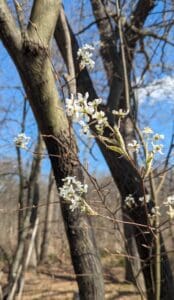
By Jennifer Fairfield
(Part 1 of this column ran yesterday.)
In the flower garden:
Much like in the veggie garden, keeping insects under control has been a challenge lately.
In my flower gardens, I’m seeing aphids on my asters, sawfly larva on my hardy hibiscus, and Japanese beetles on everything. I’ve relied on Espoma’s Insect control for the aphids and sawfly larva, but the best way to deal with Japanese beetles is to simply pluck them off the plants and drop them into a bucket of soapy water. The soap coats their wings, making it impossible for them to get out of the water, and they eventually drown.
The best time of day to do this is in the afternoon, when it has warmed up. Getting as many as you see on a daily basis will help keep them under control. If you wait too long, the few you have will suddenly turn into a mob, as they don’t like to dine alone, and once one has found your garden, it will send out signals to all its friends to come and join it.
If you are using insecticides of any kind, be aware of when to apply them. Different insects are active at different times of day, and some pesticides work best if sprayed directly on the pest. Also, be aware of bee activity in your flowers, and don’t spray any insecticides when you see bees around, or at least do targeted spraying, instead of broadcast spraying, to avoid killing bees.
Always read labels completely, and follow instructions carefully. Regardless of whether you use organic or non-organic products, they are poisons, and can be harmful to bees, as well as you, if not used properly.
Be sure to fertilize roses throughout the month, but stop fertilizing at the end of the month to allow the new growth to harden off before winter. Also remove diseased leaves immediately, and pick up any that have fallen.
Aphids and mites can be major rose pests, and can cause serious damage if not kept under control. Careful spraying when these pests are spotted is generally all that is necessary. These tasks, along with regular fungicide spraying will help keep your roses healthy.
As in your vegetable garden, keep weeds under control in the flower garden, so they don’t compete with your flowers for moisture and nutrients.
Cut back perennials that have finished blooming.
To keep your potted annual flowers looking great all summer long, be sure to fertilize them. With frequent watering, fertilizer tends to get flushed out of the container, so regular feedings are a must. Also, don’t forget to deadhead. By removing dead flowers, you encourage the growth of new ones throughout the season.
And don’t forget to water.
Regularly water any trees and shrubs planted this year. And if our dry conditions keep up, consider watering any trees and shrubs you planted in past years to keep them from becoming stressed leading into winter.
Tree watering bags can be a life-saver (literally for your trees, and figuratively for you) during extended dry periods like we had in June. You only have to fill them up once or twice per week, and they slowly water your trees for you.
Do not apply fertilizer to trees or shrubs after the 4th of July, to avoid a flush of new growth that doesn’t have time to harden before winter.
Finish up pruning of trees and shrubs this month or early next. Pruning too late in the season can encourage new growth that will not have time to harden off before winter sets in.
Lawn:
When mowing this summer, leave your grass between 3 and 4 inches tall, and only cut off the top third of the blades at each mowing. Keeping your grass a little higher will help it retain moisture during the hot, dry summer we usually have, and will help suppress weeds.
The larva of the nasty Japanese beetles we’re seeing now are the grubs that will be eating your grass roots later in the season, causing patches of brown, dead grass that, unlike grass that is dormant, won’t be growing back.
If you are seeing a lot of adult beetles now, and can’t keep them under control (a next-to impossible task), the best thing you can do is to control the larva. Milky spore is a long-term control option that we carry in the store. Milky spore is a bacterial disease that kills the grubs when they ingest it. It can be effective for many years, but also takes a few years to kill off all of the grubs, so don’t expect immediate results.
For the Birds:
Keep your birdbaths full, and consider putting out additional baths or even filling things like overturned trash can lids or large saucers with water for them. The dry conditions we generally have in summer are as difficult on birds as on our gardens, and they are going to be looking for water wherever they can find it. One place they may try to relieve their thirst is in your garden – by biting into and sucking out the juice of your crops.
Making sure they have a consistent source of water may save your harvest. Just be sure to dump the water and refill it every day, to discourage mosquitoes from laying eggs.
Keep hummingbird feeders cleaned out and filled. Sugar water left out in the heat for a number of days can breed bacteria that is harmful to the beautiful birds visiting your feeders, so be sure to clean them out every few days.














